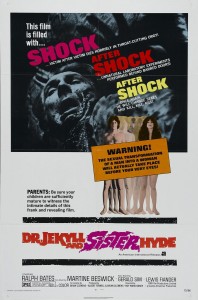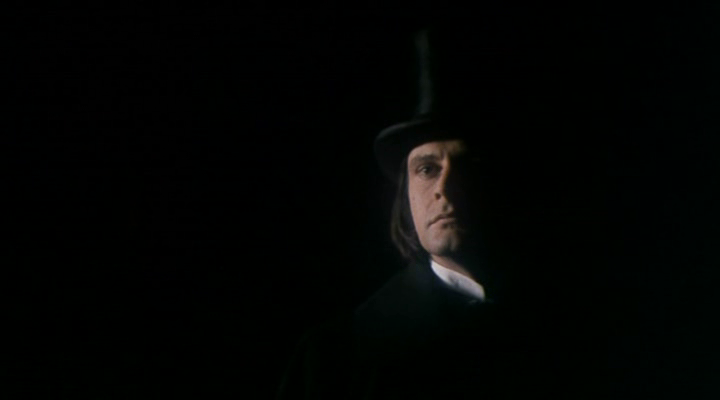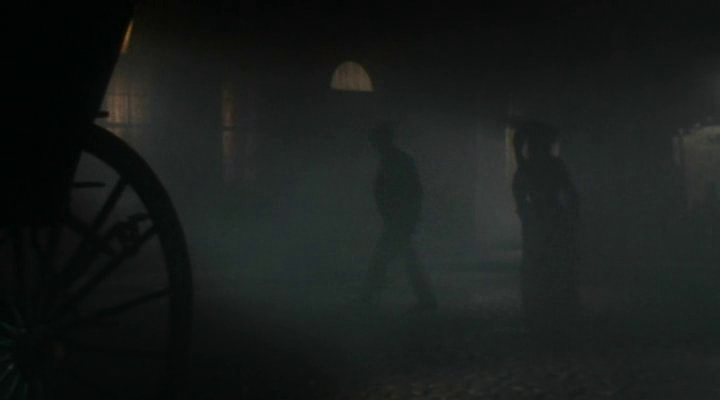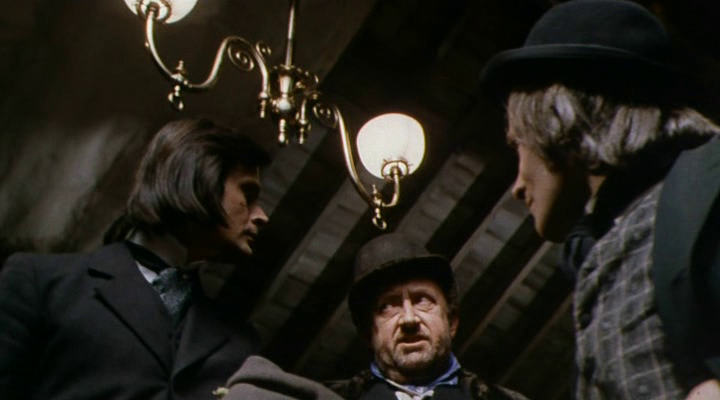|

Synopsis:
In his search for an elixir of life, Dr. Jekyll (Ralph Bates) accidentally discovers he can change into a female (Martine Beswick) by drinking a potion made from the hormones of dead women, and goes on a killing spree in the name of science. Meanwhile, his sweet downstairs neighbor (Susan Brodrick) continues to nurse a crush on the elusive Dr. Jekyll, while her brother (Lewis Fiander) lusts after Jekyll’s sultry “sister” (Beswick).
|
|
Genres, Themes, Actors, and Directors:
- Gender Bending
- Horror
- Mad Doctors and Scientists
- Mistaken or Hidden Identities
- Roy Ward Baker Films
- Serial Killers
Review:
This gender-bending take on Robert Louis Stevenson’s oft-filmed novella (scripted by Brian Clemens and directed by Roy Ward Baker) is surely one of the most original and creatively structured. Skillfully (albeit anachronistically) weaving in both the Whitechapel (a.k.a. Jack the Ripper) murders and grave robbers Burke and Hare, Clemens’ script portrays Jekyll as an admirable if hubris-filled scientist who will stop at nothing for the “greater good” of creating a series of life-saving anti-illness serums — which can only happen if he extends his own lifespan (hence, the sudden switch in focus). Interestingly, Jekyll’s transformation into a woman signals all sorts of provocative sexual and gender-based identity issues: Hyde (Beswick) seems less shocked than thrilled and turned on by her new, sexy body. Does becoming female allow Jekyll to finally explore his sexual desires in the only way possible for such a mono-focused, head-bound individual? Is Jekyll transgendered, at least on a subconscious level? Hyde openly acts upon her sexual desires by aggressively pursuing the man upstairs (Fiander); was Jekyll himself secretly attracted to Fiander all along? Jekyll’s interest in Brodrick never manifests as anything other than a compulsion to “be normal”, whereas Hyde’s interest in Fiander is primal: what does this say about his “real” urges? Meanwhile, when Jekyll visits a morgue attendant to purchase young female bodies for his studies, the attendant openly assumes necrophiliac interests much like his own. While it won’t appeal to purists, Dr. Jekyll & Sister Hyde is recommended for those who enjoy pushing the limits of literary tropes and classic characters.
Note: As others have pointed out, it helps that Bates and Beswick both possess gender-fluid, similarly structured faces; it’s not hard to imagine them as flip sides of one person.
Redeeming Qualities and Moments:
- Ralph Bates as Dr. Jekyll

- Fine cinematography, direction, and sets


- A clever, risque script: “I hope you’re not going to choose her; I’ve grown fond of her.”
Must See?
Yes, as an unusual and provocative take on a classic tale.
Categories
Links:
|




2 thoughts on “Dr. Jekyll & Sister Hyde (1971)”
First viewing. Not must-see.
I’m afraid I wasn’t taken with this switch on the Stevenson tale. Aside from the fact that the original is now overly familiar, my interest was low since I didn’t feel the need to read into whatever deeper implications might rest within…mainly since none of that is explored directly within the film itself. Had that not been the case…
The film is certainly given good production value. But though I like a number of the director’s films, this one seems workman-like. But how could it not be, really, given the script?
It’s not a dull movie, per se – and others may find it more compelling than I did. I was mostly bored.
A splendid, latter era Hammer classic and well worth seeing for those so inclined.
To film buffs, it’s probably not a must see film. However, for those who specialise in horror, sci-fi and fantasy it’s a must see. Certainly fans of the Stevenson tale will want to see this imaginative and well written variation.